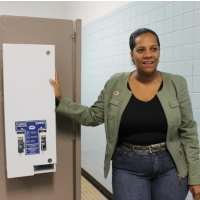New York to be First City in Nation to Require Free Tampons and Pads in Schools, Shelters and Jails
 Julissa Ferreras-Copeland with free feminine hygiene dispenser at a Queens high school (photo: Ferreras-Copeland)
Julissa Ferreras-Copeland with free feminine hygiene dispenser at a Queens high school (photo: Ferreras-Copeland)
By Jennifer Peltz, Associated Press
NEW YORK (AP) — New York City is on track to become the nation's first city to require free tampons and sanitary pads in public schools, homeless shelters and jails after lawmakers approved the idea Tuesday amid a national discussion of the costs of having a period.
The proposal, which Democratic Mayor Bill de Blasio's administration supports, marks a new direction in activists' push to dismantle what they see as unfair financial barriers between women and needed sanitary products. New York state lawmakers voted last month to become the sixth state to eliminate sales tax on the items.
City Councilwoman Julissa Ferreras-Copeland's proposal would make pads and tampons free in restrooms that serve 300,000 schoolgirls, and it would guarantee the products' availability to 23,000 women in homeless shelters and add the force of law to jail standards about sanitary supplies.
Supporters say New York would lead cities by having a law, rather than more changeable policies, in a wide range of locales.
"They're as necessary as toilet paper," so they ought to be just as freely accessible, Ferreras-Copeland, a Democrat, said before Tuesday's 49-0 vote.
During the discussion, the council's female speaker waved a wrapped tampon aloft in the spirit of bringing a once-taboo subject into the open. Even a male lawmaker who found the subject a bit uncomfortable praised the proposal.
It's unclear when the mayor will take up the measure, which would provide an estimated 2 million tampons and 3.5 million pads per year in shelters alone. Once dispensers are installed, it's expected to cost about $2.5 million annually in the city's $82 billion budget.
To some extent, schools, shelters and lockups in New York and elsewhere already provide the supplies for free, and the issue has started bubbling up in various lawmakers' chambers. The Dane County Board in Wisconsin, for instance, voted late last year to experiment with providing free tampons and pads in some buildings in the capital county, an idea adapted from a test project that Ferreras-Copeland helped spearhead in 25 New York City schools last year. A Wisconsin state legislature proposal to require the products to be free in public schools and state buildings has stalled so far.
Advocates say the measure also would make the free sanitary supplies more readily available by putting them in restrooms, instead of nurses' offices, in schools with female students in sixth grade and up. Girls who need pads or tampons now have to scramble to try to get to the nurse and then the restroom in breaks between classes, says Lineyah Mitchell, a graduating senior at Brooklyn Technical High School.
Rather than do that and risk being late, girls learn to "know the friend in that class who has extra pads," Mitchell, 17, said at a rally before the vote.
Homeless shelters and jails already provide free menstrual supplies on request, according to the city administration. Women's advocates suggest the supplies are inadequate, but officials say they provide what's needed.
Social Services Commissioner Steven Banks, who oversees homeless shelters, applauded the proposed requirement Tuesday, saying it "expands on and enshrines into law" existing policies.
Meanwhile, New York's statewide sales tax exemption on menstrual supplies is awaiting Democratic Gov. Andrew Cuomo's signature, which is expected.
Several states have weighed eliminating the tax this year, with mixed results. While New York said yes, a Utah legislative committee voted down the idea in March.
To Learn More:
The Big Tampon Tax Debate (by Hallie Golden, Associated Press)
- Top Stories
- Unusual News
- Where is the Money Going?
- Controversies
- U.S. and the World
- Appointments and Resignations
- Latest News
- Trump Orders ICE and Border Patrol to Kill More Protestors
- Trump Renames National Football League National Trump League
- Trump to Stop Deportations If…
- Trump Denounces World Series
- What If China Invaded the United States?






Comments